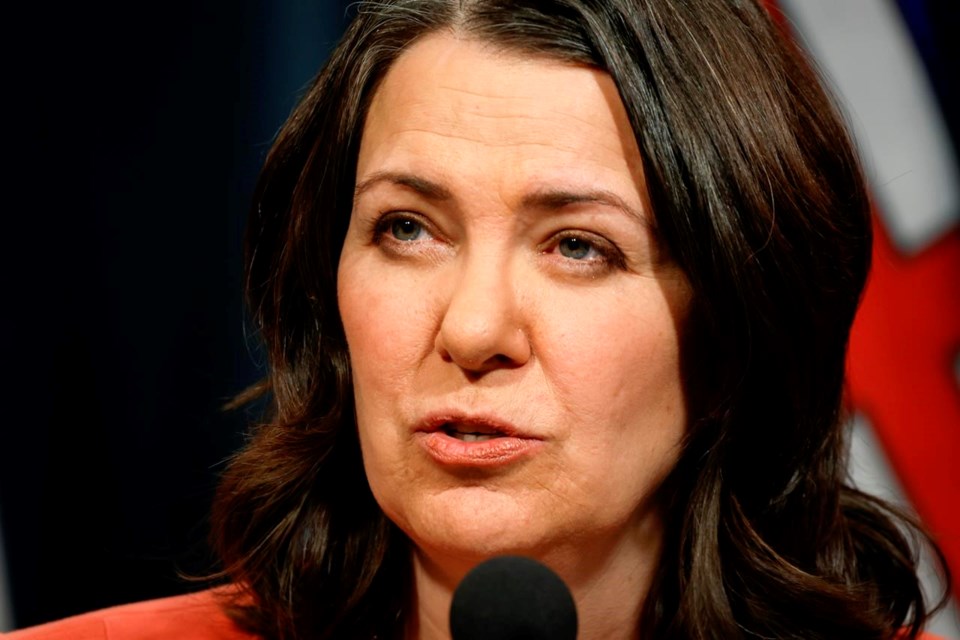EDMONTON — The Alberta government says it could not find any emails to substantiate an allegation that one of Premier Danielle Smith’s staffers wrote to prosecutors to try to influence how they handled cases tied to a blockade in Coutts, Alta., last year at the Canada-U.S. border crossing.
But critics and political observers say the email review raises more questions than answers, including why the premier held an investigation that didn’t speak with anyone involved.
“A comprehensive review of emails has not generated any records of contact between the Alberta Crown Prosecution Service and the premier’s office staff,” the Justice Department said in a statement Monday.
It said that over the weekend, civil servants reviewed almost a million incoming, outgoing and deleted emails spanning a four-month period.
The department said there would be no further investigation unless other evidence surfaces.
Smith responded in a statement that she has "full faith" a thorough and comprehensive review was conducted.
“An independent Crown prosecution service, free from political interference, is integral to the preservation of public confidence in the justice system," her statement Monday said.
Kimberley Goddard, the assistant deputy minister of the prosecution service, added in a statement that her office "fully co-operated with the independent and comprehensive review" and "continued suggestions of impropriety without evidence are not warranted."
Smith announced the review Saturday after a CBC News story last week, citing unnamed sources, that stated emails had been sent by a staffer to those prosecuting cases related to COVID-19 protests that tied up the border crossing at Coutts a year ago. CBC said it has not viewed the emails in question.
In a story Monday, Chuck Thompson, head of public affairs for CBC, said it stands behind the journalism in its story.
Opposition NDP member Rakhi Pancholi accused the United Conservative Party premier of conducting a “coverup” and renewed her call for a full independent investigation.
Pancholi said the investigation did not talk to anyone involved and its parameters were narrow, as it did not take into account personal email accounts and discussions.
“There may be things that are captured in conversations. That’s why whenever an investigation is done, they don’t simply rely on a control-F search,” Pancholi told reporters.
“We don’t know what has taken place, but we want to make sure that Albertans have the confidence in the outcomes and in the administration of justice.”
Pancholi said Smith originally promised all prosecutor emails would be checked, but Monday’s news release stated “relevant prosecutors” were checked. It did not explain how relevant was defined.
Political scientist Lori Williams said a short, circumscribed search that does not examine personal emails will not overcome the government’s credibility gap on this issue, and that a full independent review is needed.
“What they’re trying to do is get this done quickly and, frankly, a bit dismissively,” said Williams, with Mount Royal University in Calgary.
“I don’t know the actions and statements so far reflect that they understand how serious this is. This isn’t just about a speeding ticket. This is about very serious criminal charges.”
RCMP laid charges against several people involved in the three-week blockade, held to protest COVID-19 restrictions. The charges range from mischief to conspiracy to commit murder.
Police have alleged a group at the protest was willing to use force against officers if the blockade was disrupted and described the threat as "very serious.''
Law professor Lorian Hardcastle with the University of Calgary said in an interview that the review "seems hasty and potentially narrow, and perhaps intentionally narrow in order to not find anything."
"At least that’s the impression it sends," Hardcastle said. “(The review) doesn’t cover off phone calls, for example, which are another common way that people might communicate.”
Hardcastle said the premier also needs to “dial back” the numerous statements she has made that are shaping public discussion around the prosecutions.
Over the past month, Smith has given five versions of what she said to justice officials about COVID-19 cases.
She has said she talked to prosecutors directly and did not talk to prosecutors directly. She has said she reminded justice officials of general prosecution guidelines, but at other times said she reminded them to consider factors unique to the COVID-19 cases. She has also suggested the conversations are ongoing and that they have ended.
She has attributed the confusion to “imprecise” word choices.
Smith has long been openly critical of COVID-19 masking, gathering and vaccine mandate rules, questioning if they were needed to fight the pandemic and labelling them intolerable violations of personal freedoms.
She has also called those unvaccinated against COVID-19 the most discriminated group she has seen in her lifetime.
Last fall, she said charges in the cases were grounded in politics and should be open to political solutions. But she recently said it’s important to let the court process play out independently.
This report by The Canadian Press was first published on Jan. 23, 2023.
Dean Bennett, The Canadian Press




